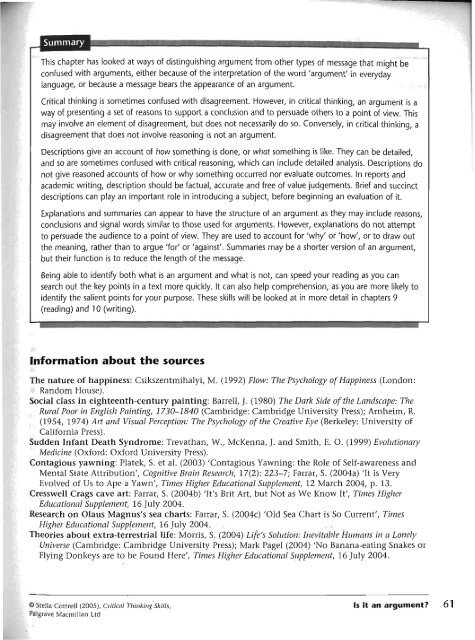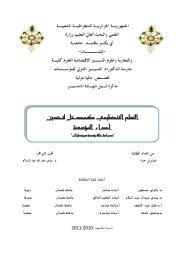Critical Thinking Skills - Developing Effective Analysis and Argument(2)
Critical Thinking Skills - Developing Effective Analysis and Argument(2)
Critical Thinking Skills - Developing Effective Analysis and Argument(2)
You also want an ePaper? Increase the reach of your titles
YUMPU automatically turns print PDFs into web optimized ePapers that Google loves.
This chapter has looked at ways of distinguishing argument from other types of message that might be<br />
confused with arguments, either because of the interpretation of the word 'argument' in everyday<br />
language, or because a message bears the appearance of an argument.<br />
<strong>Critical</strong> thinking is sometimes confused with disagreement. However, in critical thinking, an argument is a<br />
way of presenting a set of reasons to support a conclusion <strong>and</strong> to persuade others to a point of view. This<br />
may involve an element of disagreement, but does not necessarily do so. Conversely, in critical thinking, a<br />
disagreement that does not involve reasoning is not an argument.<br />
Descriptions give an account of how something is done, or what something is like. They can be detailed,<br />
<strong>and</strong> so are sometimes confused with critical reasoning, which can include detailed analysis. Descriptions do<br />
not give reasoned accounts of how or why something occurred nor evaluate outcomes. In reports <strong>and</strong><br />
academic writing, description should be factual, accurate <strong>and</strong> free of value judgements. Brief <strong>and</strong> succinct<br />
descriptions can play an important role in introducing a subject, before beginning an evaluation of it.<br />
Explanations <strong>and</strong> summaries can appear to have the structure of an argument as they may include reasons,<br />
conclusions <strong>and</strong> signal words similar to those used for arguments. However, explanations do not attempt<br />
to persuade the audience to a point of view. They are used to account for 'why' or 'how', or to draw out<br />
the meaning, rather than to argue 'for' or 'against'. Summaries may be a shorter version of an argument,<br />
but their function is to reduce the length of the message.<br />
Being able to identify both what is an argument <strong>and</strong> what is not, can speed your reading as you can<br />
search out the key points in a text more quickly. It can also help comprehension, as you are more likely to<br />
identify the salient points for your purpose. These skills will be looked at in more detail in chapters 9<br />
(reading) <strong>and</strong> 10 (writing).<br />
nformation about the sources<br />
he nature of happiness: Csikszentmihalyi, M. (1992) Flow: The Psychology of Happiness (London:<br />
R<strong>and</strong>om House).<br />
Social class in eighteenth-century painting: Barrell, J. (1980) The Dark Side of the L<strong>and</strong>scape: The<br />
Rural Poor in English Painting, 1730-1840 (Cambridge: Cambridge University Press); Arnheim, R.<br />
(1954, 1974) AIZ <strong>and</strong> Visual Perceptiort: The Psychology of the Creative Eye (Berkeley: University of<br />
California Press).<br />
Sudden Infant Death Syndrome: Trevathan, W., McKenna, J. <strong>and</strong> Smith, E. 0. (1999) Evolutionary<br />
Medicine (Oxford: Oxford University Press).<br />
Contagious yawning: Platek, S. et al. (2003) 'Contagious Yawning: the Role of Self-awareness <strong>and</strong><br />
Mental State Attribution', Cognitive Brain Research, 17(2): 223-7; Farrar, S. (2004a) 'It is Very<br />
Evolved of Us to Ape a Yawn', Times Higher Edzlcational Supplement, 12 March 2004, p. 13.<br />
Cresswell Crags cave art: Farrar, S. (2004b) 'It's Brit Art, but Not as We IZnow It1, Times Higher<br />
Educational Supplement, 16 July 2004.<br />
Research on Olaus Magnus's sea charts: Farrar, S. (2004~)'Old Sea Chart is So Current', Times<br />
Higher Ed~icational Supplement, 16 July 2004.<br />
Theories about extra-terrestrial life: Morris, S. (2004) ~ife's Solzition: Irzevitcable humans in a Lonely<br />
Universe (Cambridge: Cambridge University Press); Mark Page1 (2004) 'No Banana-eating Snakes or<br />
Flying Donkeys are to be Found Here1, Times Higher Edzicational Szrpplemeizt, 16 July 2004.<br />
0 Stella Cottrell (ZOOS), <strong>Critical</strong> Thiizkiilg <strong>Skills</strong>,<br />
Palgrave Macmlllan Ltd<br />
IS it an argument 61



